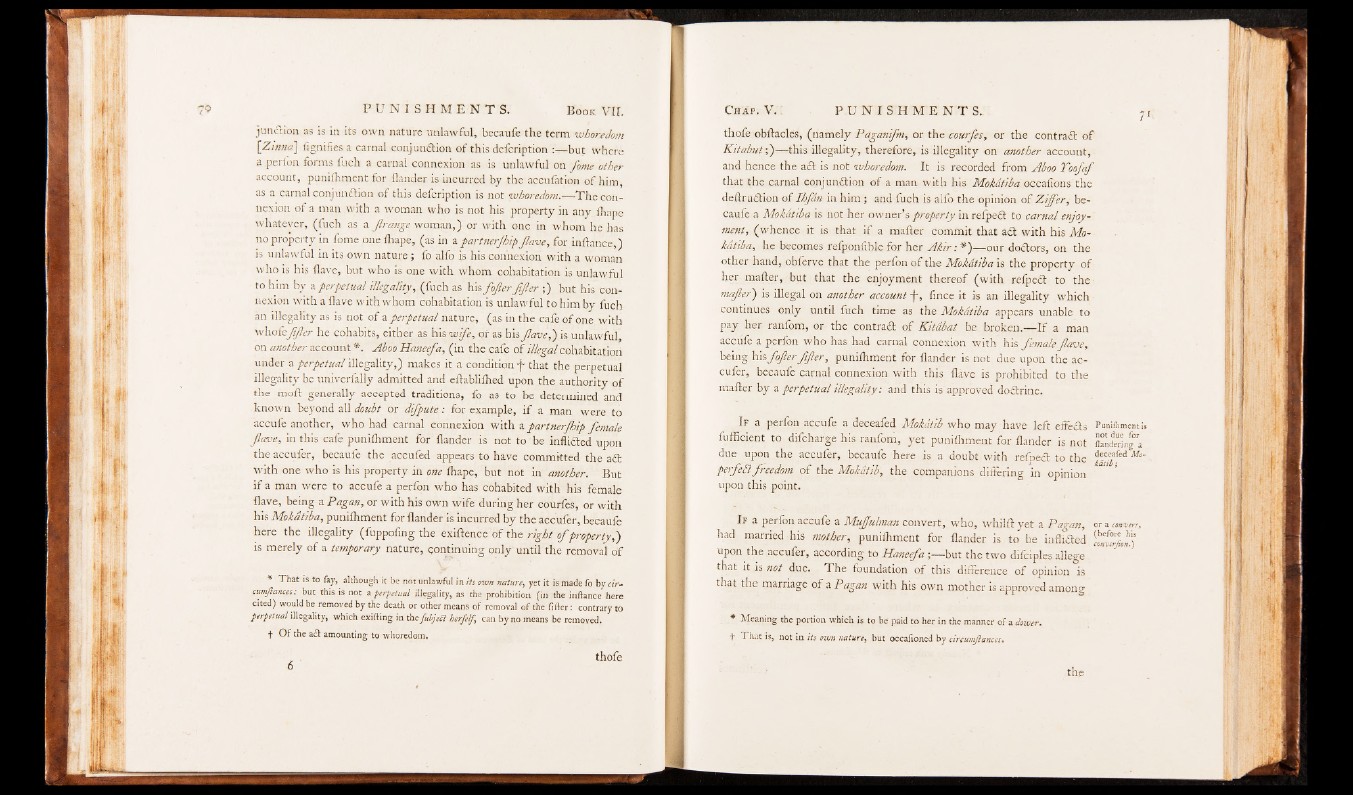
junction as is in its own nature unlawful, becaufe the term whoredom
\Zinna\ fignifies a- carnal conjun&ion of this defcription :— but where
a perfon forms fuch a carnal connexion as is unlawful on fome other
account, punilhment for Hander is incurred by the aceufation of him,
as a carnal conjunction of this defcription is not whoredom.-—The connexion
of a man with a woman who is not his property in .any lhape
whatever, (fuch as a Jirange woman,) or with one in whom he has
no property in fome one lhape, (as in ajbartnerjhip fa v e , for inftance,)
is unlawful in its own nature ; fo alfo js his connexion with a woman
who is his Have, but who is one with whom cohabitation is unlawful
to him by a perpetual illegality, (fuch as his fofler JiJler ;) but his connexion
with a Have with whom cohabitation is unlawful .to him by fuch-
an illegality as is not of a perpetual nature, (as in the cafe of one with
who fejifter he cohabits, either as his wife, pf as his Jlave,) is unlawful
on another account * . Ahoo Haneefa, (in the cafe of illegal cohabitation
under a perpetual illegality,) makes; it a condition + that the.perpetual
illegality be univerfally admitted and ellablilhed upon the authority of
the moll generally accepted traditions, fo as to be determined and
known beyond all doubt or difpute: for example, i f a man were to
accufe another, who had carnal connexion with a partnerJhip female
fa v e , in this cafe punilhment for Hander is not to be infli&ed upon
the accufer, becaufe the accufed appears to have committed the adl
with one who is his property in one lhape, but not in another. But
if a man were to accufe a perfon who has cohabited with his female
Have, being a Pagan, or with his own wife during her courfes, or with
his Mokdtiba, punilhment for Hander is incurred by the accufer, becaufe
here the illegality (fuppofing the exillence of the right o f property,)
is merely of a temporary nature, continuing only'until the removal of
* T h a t is to fay, although it be not unlawful in its own nature, yet it is made fo by cir-
cumjlances: but this is not a perpetual illegality, as the prohibition (in the inftance here
cited) would be removed b y the death or other means o f removal o f the lifte r : contrary to
perpetual illegality, which exifting in the fubjetl herjelf, can by no means be remoyed.
f O f the adt amounting to whoredom.
thofe
thofe obftacles, (namely Paganifm, or the courfes, or the contract o f
Kitabut',)— this illegality, therefore, is illegality on another account,
and hence the a£t is not whoredom. It is recorded from Aboo Toofaf
that the carnal cqnjundtion of a man with his Mokâtiba occalions the
deftrudtion o f Ihfan- in him ; and fuch is alfo the opinion of Zijfer, becaufe
a Mokâtiba is not her owner’s property in refpedt to carnal enjoyment,
(whence it is that if a mafler commit that act with his Mokâtiba,
he becomes refponfible for her Akir : * )— our doftors, on the
other hand, obferve that the perlon of the Mokâtiba is the property of
her mailer, but that the enjoyment thereof (with refpedt to the
mafier) is illegal on another account j , lince it is an illegality which
continues only until fuch time as the Mokâtiba appears unable to
pay her ranfom, or the contract of Kitâbat be broken.— I f a man
accufe a perfon who has had carnal connexion with his female fa v e ,
being hlisfofer ffle r , punilhment for Hander is not due upon the accufer,
becaufe carnal connexion with this Have is prohibited to the
mafler by a perpetual illegality: and this is'approved doftrine.
I f a perlon-acculé a deceafed Irlokatib who may have left eflèdts Punilhment i*
fufficient to difcharge his ranfom, yet punilhment for Hander is not fcndtinga
dup upon the accufer, becaufe here is a doubt with refpedt to the ^ “ afed M‘ ~
perfeBfreedom of the Mokâtib, the companions differing in opinion
upon this point.
If a perfon accufe a Mufulman convert, who, whilft yet a Pagan, or a convert,
had married his mother, punilhment for Hander is to be inflidted ww}on)
upon the accufer, according to Haneefa ;i|~but the two difciples allege
that it is not due. The foundation of this difference of opinion is
that the marriage of a Pagan with his own mother is approved among
* Meaning the portion which is to be' paid to her in the manner o f a dower.
t T h a t is, not in its own nature, but occafioned by cireumjlances.
the